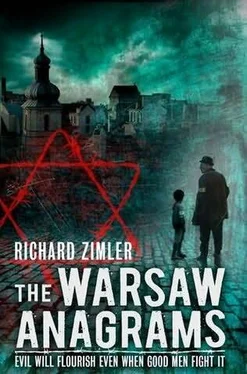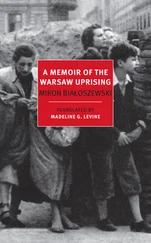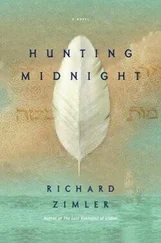‘Do you know which secret passage Georg used to get out of the ghetto?’ I asked.
He held out his palm for more money. I snatched his hand. ‘Listen, Zachariah, this goes beyond money – I need to know very badly.’
‘Georg went right through the wall,’ he answered. ‘He and some other boys knocked out some bricks one night.’
‘Where?’
‘I don’t know.’
‘On Okopowa Street, near the cemetery,’ an older boy with a scab on his chin told me. ‘I was with him.’
I motioned him over and he squatted down beside me.
‘Did he ever speak about meeting anyone dangerous or threatening?’ I asked.
‘No.’
Zachariah agreed with that. He rubbed his eye with his knuckle. I noticed a louse crawling in his eyelashes. I took his shoulder. ‘Don’t move,’ I told him.
I pulled out the wretched parasite between my thumb and forefinger, then crushed it with my nail.
‘What was that?’ he asked.
‘Just a bug,’ I replied, tossing it away. ‘Listen, did Georg ever say why he didn’t go back to the orphanage?’
‘He hated being cooped up!’ Zachariah exclaimed, as if that answer might win him a ticket to the cinema.
‘And do you know where he was living?’
‘On Nowolipie Street.’
‘What number?’
Zachariah made a face and hunched up his shoulders to indicate he didn’t know.
‘Georg was kind of secretive,’ the older boy said solemnly.
‘What did he look like?’
‘He had big ears – like an elephant,’ Zachariah told me. He tugged on his earlobes.
‘Did you ever see him naked?’
‘Naked how?’ he asked, puffing out his lips in puzzlement.
‘I need to know if he had any identifying marks on his hip.’
As soon as I finished my question, a jolt of understanding made me gasp. I realized now what might have made Adam’s leg special.
‘No, I never saw his hip,’ the older boy told me.
‘Me neither!’ Zachariah chimed in.
I got to my feet. The two boys did, as well. I continued my questioning, but I felt as if I’d crossed an invisible portal into a myth, in which the only way to identify brothers and sisters separated at birth was by a telltale sign on their skin. And Adam’s telltale sign was on his ankle – his right ankle: a line of four birthmarks. But of what value could they have possibly been to anyone? And could something so small and insignificant really have summoned Death to my nephew?
‘How about Georg’s clothing – anything unusual?’ I asked the acrobats.
‘I know the answer to that one!’ Zachariah exclaimed, his eyes brightening. ‘He had newspapers stuffed into his shoes!’
‘That’s all?’ I asked.
‘And he wore a chain around his neck,’ the older boy told me.
‘What kind of chain?’
‘With a little Virgin Mary at the end. He said his mother was Jewish, but that his father was Russian. His father had hung that necklace around his neck when he was just a baby. He never took it off.’
‘And Georg juggled, right?’
Zachariah nodded.
‘Did he do anything else to earn money?’
‘No,’ the little boy replied, but the older acrobat added, ‘Georg sometimes sang while he juggled. Mostly Yiddish folk songs. He said it got him a bigger crowd.
‘Was he any good?’
‘Pretty good, but he wasn’t the best juggler in the world. He could do only four pairs of socks. And sometimes one would fall.’
‘Socks?’
‘That’s what he juggled – he rolled each pair into a tight ball.’
By now, I’d realized that Rowy or Ziv was sure to have noticed him sooner or later while looking for new singers. Was it possible that they were both involved in Adam’s murder? Rowy was terrified of being conscripted again into a labour gang, and perhaps he had exchanged the lives of three Jewish children for a guarantee of safety. As for Ziv, what did I really know about him, other than that he was shy and awkward, and an exceptional chess player?
‘Did Georg ever talk about singing in a chorus?’ I asked Zachariah and his colleague.
‘He said something like that once,’ the older boy replied. ‘He mentioned to me that a man told him he could sing at a concert he was going to organize.’
‘Did Georg tell you the man’s name or what he looked like?’
He shook his head. ‘Sorry.’
I gave him a złoty with my thanks, and he ran off.
‘Where’s mine?’ Zachariah whined.
‘If I give you more money, I need you to do something for me,’ I told him.
‘What?’
‘I want you to get disinfected at the Leszno Street bathhouse. You know where it is?’
‘Of course.’
‘Good.’ I dropped two złoty – one after the other – into his excited hands. I wanted to tighten the scarf I’d given him around his neck – as an excuse for holding him once more – but he dashed off before I could, one hand securing his crown.
Dorota refused to let me into her apartment once again. ‘My husband isn’t home,’ she confessed, ‘but if he ever learned that a man asking about Anna had been here…’ She shook her head as if dealing with his temper was a constant burden.
‘Just tell me about your daughter’s hand,’ I told her gruffly.
She drew back her head like a surprised hen. ‘There’s nothing to tell.’
‘Did it have any birthmarks?’
‘No.’
‘Anything else that would make it identifiable to someone who’d never seen her before?’
‘I don’t know – just a small patch… a discoloration on the back,’ she said doubtfully. ‘But why are you-?’
‘What did the patch look like?’ I interrupted.
‘It was tiny and red – like a stain. On the skin between her thumb and index finger. People were always trying to wipe it clean when she was little.’
‘Why in God’s name didn’t you tell me that before?’ I demanded angrily.
‘It was so small. And it seemed so unimportant. Besides, Anna was ashamed of it.’ She reached for my arm. ‘The poor girl hated it!’
Outside Dorota’s apartment house I took my first steps too quickly and slipped on the fresh snow. The trunk of a beech tree saved me from a bad tumble. Embracing it, standing apart from the people hurrying past, I saw that Adam and Anna had both been marked at birth. And if I was right, then Georg had been, too. Someone had wanted their skin blemishes and birthmarks. But why?
Everything pointed to their having been murdered outside the ghetto and then dumped in the barbed wire. And it seemed clear now that Georg was recruited by either Rowy or Ziv. One of them must have identified the children to the murderer – a German or possibly Pole – who had had the kids followed and snatched.
I was anxious to question both men, of course, but doing that would do little good, I reasoned; if one or both of them were guilty, they’d try to cast the blame on someone else – probably on Mikael, since there was no reason why they wouldn’t be able to make the same deductions I had. Or would they simply tell me that they couldn’t have known that Adam and Georg had any skin blemishes? After all, it was unlikely that they’d seen either boy naked or – during our frigid winter – in short pants. Only one person could have – Mikael.
Maybe Anna had threatened to denounce him for his abortions and he had asked whoever was working with him on the outside to kill her when she left the ghetto. In that case, the murderer had waited until she visited Mrs Sawicki, then lured her away.
I hailed a rickshaw, sure of only one thing: I’d resume following Mikael as my most likely suspect. But as soon as we set off for his office, a fact I’d overlooked made me call out to the driver that we needed to change our destination.
Читать дальше












